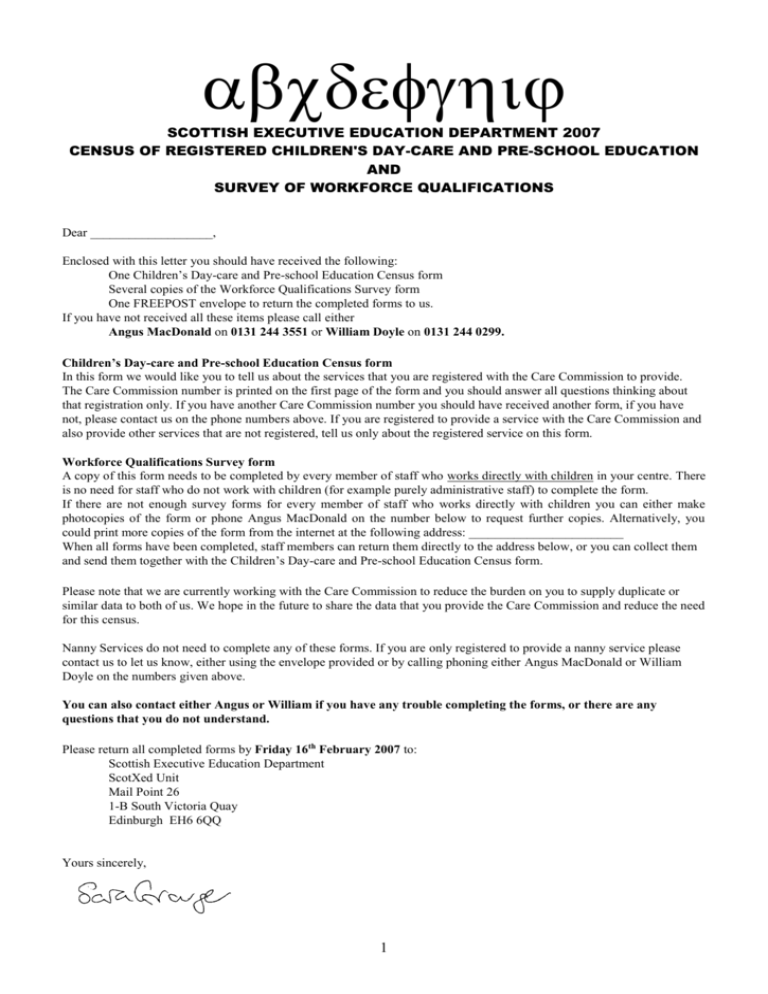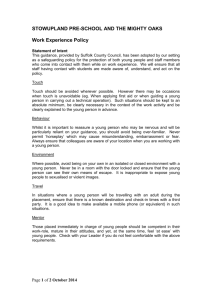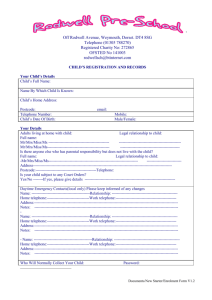Open
advertisement

SCOTTISH EXECUTIVE EDUCATION DEPARTMENT 2007 CENSUS OF REGISTERED CHILDREN'S DAY-CARE AND PRE-SCHOOL EDUCATION AND SURVEY OF WORKFORCE QUALIFICATIONS Dear ___________________, Enclosed with this letter you should have received the following: One Children’s Day-care and Pre-school Education Census form Several copies of the Workforce Qualifications Survey form One FREEPOST envelope to return the completed forms to us. If you have not received all these items please call either Angus MacDonald on 0131 244 3551 or William Doyle on 0131 244 0299. Children’s Day-care and Pre-school Education Census form In this form we would like you to tell us about the services that you are registered with the Care Commission to provide. The Care Commission number is printed on the first page of the form and you should answer all questions thinking about that registration only. If you have another Care Commission number you should have received another form, if you have not, please contact us on the phone numbers above. If you are registered to provide a service with the Care Commission and also provide other services that are not registered, tell us only about the registered service on this form. Workforce Qualifications Survey form A copy of this form needs to be completed by every member of staff who works directly with children in your centre. There is no need for staff who do not work with children (for example purely administrative staff) to complete the form. If there are not enough survey forms for every member of staff who works directly with children you can either make photocopies of the form or phone Angus MacDonald on the number below to request further copies. Alternatively, you could print more copies of the form from the internet at the following address: ________________________ When all forms have been completed, staff members can return them directly to the address below, or you can collect them and send them together with the Children’s Day-care and Pre-school Education Census form. Please note that we are currently working with the Care Commission to reduce the burden on you to supply duplicate or similar data to both of us. We hope in the future to share the data that you provide the Care Commission and reduce the need for this census. Nanny Services do not need to complete any of these forms. If you are only registered to provide a nanny service please contact us to let us know, either using the envelope provided or by calling phoning either Angus MacDonald or William Doyle on the numbers given above. You can also contact either Angus or William if you have any trouble completing the forms, or there are any questions that you do not understand. Please return all completed forms by Friday 16th February 2007 to: Scottish Executive Education Department ScotXed Unit Mail Point 26 1-B South Victoria Quay Edinburgh EH6 6QQ Yours sincerely, 1 Sara Grainger 2 GUIDANCE NOTES MANAGEMENT ARRANGEMENT OF SERVICES Services provided within a local authority school should tick ‘local authority’. Services provided within an independent school should tick ‘private’, even if they officially have charitable status. Services provided by registered charities should tick ‘Voluntary / charitable’ even if staff members receive a salary or parents pay for the services. Services provided by Parent’s Associations or any other groups who do not seek to make a profit should tick ‘Voluntary / charitable’. Services that are not provided by a charity or a school and who make a profit (or seek to make a profit) should tick ‘private’. TYPE OF PREMISES USED Centres own premises are premises that are not used at other times by other organisations. They do not have to be owned outright by the service and may include, for example, rented rooms within other buildings. Services provided in their own dedicated premises that are situated on a school campus or site but not within the school building itself should tick ‘Centres own dedicated premises’. Nursery schools that are not attached to a primary school should tick ‘Centres own dedicated premises’. Services provided within a school building should tick ‘School premises’. This would include nursery classes within a primary school. Services provided any-where else, where premises are shared with other organisations, should tick ‘other’. DEFINITIONS OF SERVICES Family support services / outreach / Parent’s support group This should be taken to mean services which offer parents opportunities to assist their child's development and achieve greater satisfaction in their role as parents, provide support to parents which will assist in providing a healthy upbringing for their child, promote self-esteem and personal confidence in both children and parents and provide opportunities for parents to acquire skills which lay the basis for more extensive training or subsequent employment. Professional health care Services provided by professional health staff such as midwives, health visitors, speech therapists, psychologists, doctors and dental practitioners including antenatal care, postnatal care and support, child health clinics/screening and support groups where these are run by health professionals. Gaelic provision Services wholly or primarily in the Gaelic medium Outdoor play area Self explanatory – any area out of doors available to the children attending the centre, which may also be shared with others or available to the wider community. Nursery This category includes daycare and pre-school centres for children aged 5 or under including local authority pre-school classes and nurseries; private and voluntary daycare nurseries including centres providing pre-school education in partnership with the local authority; and community and workplace nurseries. The services will normally be used by parents on a regular rather than a drop-in basis and be provided for at least the school term. Playgroup These provide sessional or daycare for children aged 5 or under. Most are run by groups of parents with parent-led committees, although some may be owned by individuals or organised by other voluntary bodies or by the local authority. They rely heavily on parents/carers who volunteer their services although they may employ paid staff e.g. a play leader or assistant. Some playgroups will provide pre-school education in partnership with the local authority. Out of school club Out of school clubs offer care for school age children in the absence of parents or carers from the end of the school day until parents can collect their children, and also before school starts. Breakfast club This is a specifically designated breakfast club that is likely to provide a meal and will take place before school hours. 3 Crèche A crèche provides ‘drop in’ care for children in order to enable adults to engage in activities such as further education, shopping or attending a meeting. Children/Family centre Child and family centres provide services similar to those available in community nurseries and nursery centres. Daycare/education is provided along with a range of support services for families which can be adapted to meet local needs. They are usually managed by voluntary organisations or by the local authority’s social work or education department. Sitter service A Sitter Service provides childcare in the family’s own home from early morning until late evening seven days a week. Holiday play scheme Holiday play schemes cater mainly for school age children and provide opportunities for children to participate in a broad range of supervised leisure and educational activities during school holidays. CHILDREN REGISTERED OR ATTENDING DURING CENSUS WEEK We are looking for the total number of children on your books in census week. This should include any children who would normally have attended during census week but could not do so due to, for example, being off sick or on holiday. If you do not have a register of children who normally attend, please count the children who actually did attend during census week. (This will probably only be the case for crèches and similar ‘drop-in’ services). This should include all children - those receiving day care, pre-school education, or both (NB schools should not include classes other than ‘pre-school’). Every child should be counted once and once only in question 15. Any child who celebrates his/her birthday in census week should be recorded under the age that they became on their birthday. Please check that the numbers you have entered for each age group add up to the totals at the bottom. STAFF AND VACANCIES This section should include all staff working in your centre to provide pre-school education and/or children’s daycare. Pre-school classes in primary schools should include only those staff providing pre-school education, not all staff in the school. For the purpose of this form, full-time means 35 hours or more per week and part-time means less than 35 hours per week. Please use this convention even if your centre is only open for 20 hours per week, for example, or you usually mean fulltime to mean 40 hours per week. This may mean that you enter only part-time staff. For vacancies, please use the same convention where full-time means 35 hours or more. If your centre is only open for 20 hours per week and you have one vacancy for a job working 20 hours per week, enter that as a part-time vacancy. SSSC REGISTRATION The Scottish Social Services Council (SSSC) are responsible for the registration and regulation of the Social Service Workers which includes early education and childcare workers. Registration is part of the drive to raise standards and strengthen the professionalism of social services to ensure people who use services and carers can rely on a workforce that is properly trained, appropriately qualified and effectively regulated. Early education and childcare workers are part of the second phase of workers to be registered by the SSSC. Phase one included for example, social workers, residential childcare workers and managers of adult day care services. Early education and childcare workers are defined as workers who are providing day care for children. With over 30,000 workers in early education and childcare, registration with the SSSC will be phased. There are three parts to the register depending on the level of work you are carrying out in the workplace. These are - Manager/Lead Practitioner, Practitioner, Support Worker. The first category of staff to be invited to register are Manager/Lead Practitioner from October 2006. Followed by Practitioner in March 2007 and Support Worker in October 2008. To register you have to hold or be working toward a required qualification. Each category has a range of qualifications which can be viewed at www.sssc.uk.com and follow the link to phase 2. 4 PRE-SCHOOL EDUCATION Pre-school education refers only to educational activities following the 3-5 Curriculum. The number of children receiving pre-school education during census week should include any children who would normally have attended during census week but could not do so due to, for example, being off sick or on holiday. Every child who received pre-school education should be counted once and once only in question 26. These children should also have already been included in question 15. The number of children included in questions 27, 28 and 29 should be a subset of those included in question 26. In question 28 count all children who have an Individual Education Programme, a Co-ordinated Support Plan or a Record of Needs. Do not count those children who are in the process of being assessed. In question 29 count all children who you consider have Additional Support Needs but do not have an Individual Education Programme, a Co-ordinated Support Plan or a Record of Needs. This will include children who are in the process of being assessed for an Individual Education Programme or a Co-ordinated Support Plan, or whose assessment has not yet begun. The concept of 'additional support needs' refers to any child or young person who, for whatever reason, requires additional support for learning. Additional support needs can arise from any factor which causes a barrier to learning, whether that factor relates to social, emotional, cognitive, linguistic, disability, or family and care circumstances. For instance, additional support may be required for a child or young person who is being bullied; has behavioural difficulties; has learning difficulties; is a parent; has a sensory or mobility impairment; is at risk; or is bereaved. There will be many other examples besides these. Some additional support needs will be long term while others will be short term. The effect they have will vary from child to child. In all cases though, it is how these factors impact on the individual child's learning that is important and this will determine the level of support required. In question 30, you need to enter the number of people who work to provide pre-school education, and the full time equivalent number of staff. Full-time equivalent should be calculated as follows:1 Add the weekly hours worked by the staff member 2 Divide by the recognised weekly hours for a Full-Time member of staff for that post 3 Express the result to two decimal places. For example, if a full-time week is 40 hours and you have 2 members of staff who work 20 hours each, that is equivalent to 1 full-time equivalent member of staff. GTC registered teachers are those registered to teach in primary/secondary or further education with the General Teaching Council of Scotland. This should be a subset of the total number of all pre-school staff. 5






